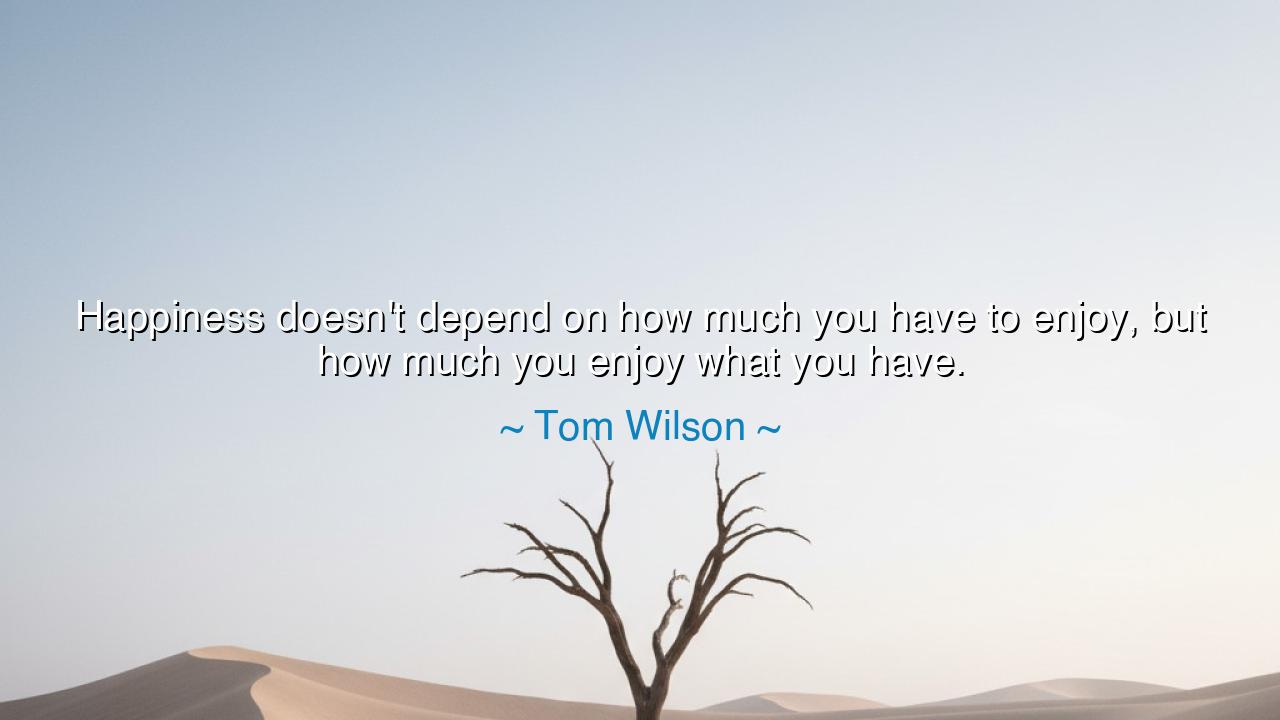
Happiness doesn't depend on how much you have to enjoy, but how
Happiness doesn't depend on how much you have to enjoy, but how much you enjoy what you have.






In the voice of gentle wisdom, Tom Wilson once declared: “Happiness doesn’t depend on how much you have to enjoy, but how much you enjoy what you have.” Within these simple words lies a truth that has echoed across centuries, from the sages of the East to the philosophers of the West. It is the eternal reminder that contentment, not abundance, is the true measure of joy. For happiness is not a treasure buried in possessions or achievements, but a flame that burns within the heart of one who knows gratitude.
The origin of this truth is as old as humanity itself. Tom Wilson, the American cartoonist best known for creating Ziggy, wrote and spoke often about the quiet joys of ordinary life — the wisdom of finding light in the small things. In a world racing toward wealth and recognition, his words call us back to the center, to the stillness of appreciation. To enjoy what you have is to recognize that every moment, every breath, and every small blessing carries infinite worth. The poor man who drinks water with gratitude may be richer in spirit than the king who feasts with discontent.
Happiness, as Wilson teaches, is a state of being, not a condition of circumstance. The ancients understood this well. Epictetus, the Stoic philosopher born a slave, taught that true freedom lies not in owning much, but in needing little. He said, “Wealth consists not in having great possessions, but in having few wants.” Likewise, the Buddha, renouncing palaces and luxury, found enlightenment not in excess but in awareness — in seeing clearly the impermanent beauty of all things. Wilson’s modern voice simply reawakens this timeless teaching: that joy is not something to be found outside oneself, but to be cultivated within.
Consider the story of Helen Keller, who, though deprived of sight and sound, lived a life radiant with happiness. She once wrote, “So much has been given to me, I have no time to ponder over that which has been denied.” Her gratitude transformed darkness into light, silence into song. Though she lacked what most consider essential for happiness, she possessed the secret of Wilson’s wisdom — to enjoy what you have, to embrace life as it is, not as one wishes it to be. Such souls show us that happiness does not belong to those who have everything, but to those who make the most of everything they have.
We live in an age that confuses abundance with fulfillment. The more we gather, the more we hunger, for the appetite of desire knows no end. Yet happiness withers when the heart is always reaching outward. Like a cup that cannot be filled because it leaks from within, the restless spirit loses joy even amid plenty. But when gratitude takes root, when one pauses to notice the fragrance of the earth, the warmth of friendship, or the quiet satisfaction of honest work, the heart becomes whole. Contentment, not accumulation, is the true art of living.
To enjoy what you have does not mean to surrender ambition, but to balance striving with serenity. The wise know how to work for more while loving what already is. They walk the middle path — grateful for the present, hopeful for the future, but never enslaved by desire. The secret is perspective: to see the value in the ordinary, the sacred in the simple. For even a humble loaf, when eaten with joy, nourishes the soul more than a feast consumed with envy.
Let this then be the teaching passed down: Count your blessings before you chase new ones. Each day, give thanks for something small — a breath, a sunrise, a kind word. When discontent stirs, remind yourself that joy is not earned by wealth, but awakened by appreciation. Train the mind to dwell not on what is missing, but on what is present, and happiness will no longer be fleeting.
For as Tom Wilson reminds us, happiness is not a gift the world bestows, but a treasure the heart creates. The one who learns to enjoy what they have holds the secret of peace, and their joy becomes unshaken by fortune or loss. Thus, happiness is not about how much you own, but how deeply you see — how much light you draw from even the smallest flame.






AAdministratorAdministrator
Welcome, honored guests. Please leave a comment, we will respond soon